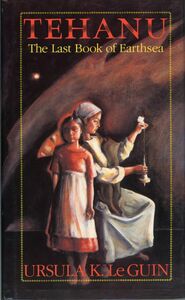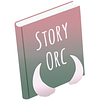Take a photo of a barcode or cover
I've been having really bad luck with books lately, so I went back to Le Guin. I knew her to be a good author, and I enjoyed the other Earthsea books. In fact, I've tried reading this book already as an audio. I had to stop, though, because the reader was pronouncing Ogion's name wrong, and that really bugged me. It's been a while since I've read the other Earthsea books so I couldn't remember all the details of what happened before. I'm not sure if that affected my reading experience for the better or worse.
At first, it threw me off how this book was focusing so much on the gender divide. I didn't remember that being such a big deal in the other books. But the more I read, the more I understood why Le Guin took this angle. Something I remember about her is how she uses the characters in her story to explore philosophy and society. She's doing the same thing here. Tenar is older and thus at a different stage of her life. Through her, the book reflects on the position of women in society and how they're viewed. When Ged comes in, the book also explores how he's viewed by society and how he views himself. It's a very character-driven and reflective book.
In a way, the other books were character-driven and reflective as well, but this one just felt more so since there wasn't much action or magic going on. It felt very grounded, and I think for this stage of Tenar and Ged's lives, it was fitting. They are working out who they are now, and helping to protect this little girl. The conclusion felt good to me. I liked that they were just wanting somewhere to live together. The whole thing felt like a nice change of pace.
Some day I'll go through the whole series and see the progression. As it is, I think this is a good conclusion to things.
At first, it threw me off how this book was focusing so much on the gender divide. I didn't remember that being such a big deal in the other books. But the more I read, the more I understood why Le Guin took this angle. Something I remember about her is how she uses the characters in her story to explore philosophy and society. She's doing the same thing here. Tenar is older and thus at a different stage of her life. Through her, the book reflects on the position of women in society and how they're viewed. When Ged comes in, the book also explores how he's viewed by society and how he views himself. It's a very character-driven and reflective book.
In a way, the other books were character-driven and reflective as well, but this one just felt more so since there wasn't much action or magic going on. It felt very grounded, and I think for this stage of Tenar and Ged's lives, it was fitting. They are working out who they are now, and helping to protect this little girl. The conclusion felt good to me. I liked that they were just wanting somewhere to live together. The whole thing felt like a nice change of pace.
Some day I'll go through the whole series and see the progression. As it is, I think this is a good conclusion to things.
challenging
emotional
reflective
slow-paced
Plot or Character Driven:
Character
Strong character development:
Complicated
Loveable characters:
Yes
Diverse cast of characters:
No
Flaws of characters a main focus:
Complicated
Moderate: Incest, Rape
What a beautiful, sad, layered book. It was both satisfying and heartbreaking to see Tenar and Ged in this new phase of their story, when they are both so wise and yet so powerless. Therru has no voice of her own until the end of the book, but she is the character you're drawn to most, all the while suspecting her true identity without being quite sure. The commentary on "women's power" is skillfully done, shown through Tenar's internal struggle and personal despair, yet there is a sense of hope and change at the end of the story. Really wonderful.
challenging
dark
medium-paced
Plot or Character Driven:
Character
Strong character development:
Yes
Loveable characters:
Yes
Diverse cast of characters:
Yes
Flaws of characters a main focus:
Yes
Moderate: Child abuse, Misogyny, Rape, Sexism, Sexual violence, Fire/Fire injury
Probably the most deeply psychological and moving fantasy book I’ve ever read. Everything in this book that wasn’t in the previous books is groundbreaking and astonishing. Everything dragged over, eg. The return of Ged and the shadow, feels almost forced and makes it feel like an epilogue.
I’ve never read a young adult book so able to envelope you completely in the main characters mind. In describing the world in this way, from the vision of a woman in a patriachal world, suddenly Earthsea is real and with that comes a degree of fear and heartbreak not seen in any other fantasy book I have read
I’ve never read a young adult book so able to envelope you completely in the main characters mind. In describing the world in this way, from the vision of a woman in a patriachal world, suddenly Earthsea is real and with that comes a degree of fear and heartbreak not seen in any other fantasy book I have read
3,5
bu kitapta da genel ayni sikinti var ve ilk uc kitaptan sonra bunu olaylar acisindan okumak biraz daha zorladi. yine de tenarin hikayesini de okumak guzeldi.
bu kitapta da genel ayni sikinti var ve ilk uc kitaptan sonra bunu olaylar acisindan okumak biraz daha zorladi. yine de tenarin hikayesini de okumak guzeldi.
“Tehanu” by Ursula K. Le Guin is the fourth book in the Earthsea fantasy series. The story is returns the reader to the island of Gont and the woman Tenar who had been brought to the Island by Ged after he had rescued her in the previous novel “The Tombs of Atuan”. Years have passed since then and she is ow as a widow with her own grown-up children. However, her seemingly ordinary life soon changes when she opts to take in a severely abused child as a foster daughter.
The book was written several years after the original trilogy and it is therefore quite different from the previous books, in both style and substance. Le Guin has quite clearly picked up a stronger feminist viewpoint since the original trilogy and has used “Tehanu” as a novel in which she can call out the inequity between the sexes in both the fantasy genre and the world in general. Fundamentally, I don’t have an issue with this except for the fact that I think she takes it too far. Perhaps this is just a defensive viewpoint from a man, but at times it almost felt like every female character was somehow worthy and important whilst the men were portrayed as weak and flawed. In fact, the way in which Ged has been reduced to depressed individual who mopes around feeling sorry for himself felt rather inconsistent with the man we had come to know in the other novels.
Her writing of course is as skilful as always and overall plot itself was rather intriguing if not brimming with action or a fast pace. But to be honest, anyone who has read any of Le Guin’s other Earthsea books should be used to that by now. The ending itself was left a little bit open for my liking but I think this is intentional as it is being used to set up future books in the series.
Overall, I did enjoy this latest book in the Earthsea series but it wasn’t a favourite of mine. I found the stripping back of Ged’s dignity a bit sore to take and the in your face feminist slant just came across to strongly.
The book was written several years after the original trilogy and it is therefore quite different from the previous books, in both style and substance. Le Guin has quite clearly picked up a stronger feminist viewpoint since the original trilogy and has used “Tehanu” as a novel in which she can call out the inequity between the sexes in both the fantasy genre and the world in general. Fundamentally, I don’t have an issue with this except for the fact that I think she takes it too far. Perhaps this is just a defensive viewpoint from a man, but at times it almost felt like every female character was somehow worthy and important whilst the men were portrayed as weak and flawed. In fact, the way in which Ged has been reduced to depressed individual who mopes around feeling sorry for himself felt rather inconsistent with the man we had come to know in the other novels.
Her writing of course is as skilful as always and overall plot itself was rather intriguing if not brimming with action or a fast pace. But to be honest, anyone who has read any of Le Guin’s other Earthsea books should be used to that by now. The ending itself was left a little bit open for my liking but I think this is intentional as it is being used to set up future books in the series.
Overall, I did enjoy this latest book in the Earthsea series but it wasn’t a favourite of mine. I found the stripping back of Ged’s dignity a bit sore to take and the in your face feminist slant just came across to strongly.
emotional
hopeful
reflective
slow-paced
Plot or Character Driven:
Character
Strong character development:
Yes
Loveable characters:
Yes
Diverse cast of characters:
Yes
Flaws of characters a main focus:
Yes
adventurous
challenging
dark
sad
tense
slow-paced
Plot or Character Driven:
Character
Strong character development:
Yes
Loveable characters:
Yes
Diverse cast of characters:
Complicated
Flaws of characters a main focus:
Yes
adventurous
challenging
inspiring
reflective
sad
slow-paced
Plot or Character Driven:
Character
Strong character development:
Yes
Loveable characters:
Yes
Diverse cast of characters:
Yes
Flaws of characters a main focus:
Yes
As with other Earthsea books, Tehanu is best read with the time and patience needed to digest what it has to say on the nature of power and gender. This line from the afterword gives a good spoiler-free taste of the incoming themes:
Maybe the change coming into Earthsea has something to do with no longer identifying freedom with power; with separating being free from being in control.
A beautiful installment in the relatively small canon of fantasy featuring middle-aged women protagonists. Ursula K. Le Guin continues to treat her characters, and the humanity of them she comments on, with both shrewdness and compassion.
Fans of soft magic also rejoice at this masterful handling of it. This latter half contains perhaps the most unnerving depiction of being cursed I've read, with no need for demons or flames or screaming agony or any of the regular theatrics.



